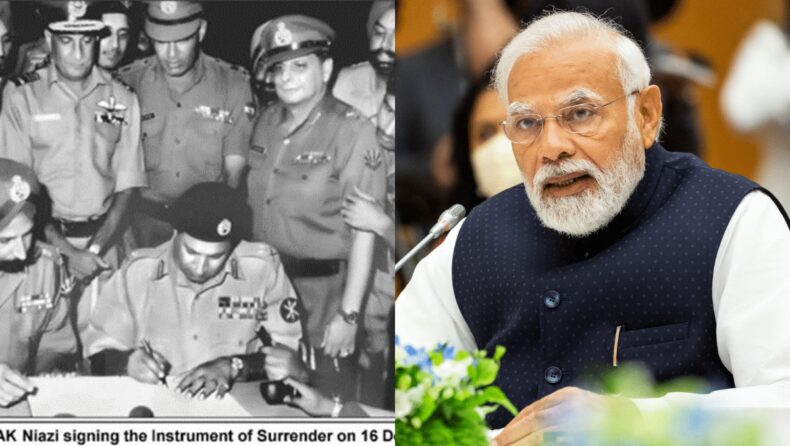On Friday, Prime Minister Narendra Modi paid tribute to the armed forces on Vijay Diwas, saying the nation will always be indebted to them for their role in keeping the country safe and secure in the 1971 war.
Prime Minister Modi tweeted on the occasion of Vijay Diwas and said, “I pay homage to all those brave armed forces personnel who ensured India attained an exceptional victory in the 1971 war. Our nation will always be indebted to the armed forces for their role in keeping the country safe and secure.”

Vijay Diwas, or Victory Day, is celebrated on the 16th of December to commemorate the landmark victory of India in the 1971 Indo-Pak War. 51 years ago, this war laid the foundation for the emergence of Bangladesh. The Indo-Pak war was fought on both the eastern and western fronts over 13 days. This day possesses immense significance for both nations. East Pakistan, formerly known as Bangladesh, came in the existence after the war.
Leaders remember the martyrs of the Indian Armed Forces on this day who laid the markable foundation for this victory. Prime Minister Narendra Modi, President Droupadi, and Defense Minister Rajnath Singh tweeted a heartfelt post for the martyrs of the nation.

This year, Vijay Diwas is being celebrated from December 14–18 to salute the exemplary courage, bravery, and sacrifice of the Indian Armed Forces who sacrificed their lives during the war. Defence Minister Rajnath Singh also visited the War Memorial today and paid homage to Indian Armed Forces personnel who courageously fought in the 1971 War and laid down their lives in service to the nation.

Historic Importance of Vijay Diwas:
This historic day has remarkable importance in the golden history of India. After the partition of India following the end of British rule in 1947, two independent countries were formed: India and Pakistan. Before this war, Pakistan had two fronts Eastern and western Pakistan. The two Pakistan had their share of problems from the beginning and the most Possible reason is the geographical disconnect between them.

East Pakistan was always neglected in terms of administration, as the top posts were held by those in the West. In addition to it, cultural conflict was a big issue at that time. For probable consideration, when Urdu, used in western Pakistan, was made the official language of the country, it turned into an imposition on the culture of the people in the east.
In the mid-1960s, active leaders such as Sheikh Mujibur Rahman, the founder of Bangladesh, began protesting against these policies and forming the Awami League. The war was triggered by the conflict in Pakistan after an East Pakistani party, the Awami League, won the elections with a stunning 160 out of 162 seats.
Despite having a clear majority in the house for the prime minister, it won’t go up in a legal way. Following this, the Pakistani army began the brutal killing of Bengali and Hindu residents of East Pakistan. The exact figure of deaths is unknown to the day but is estimated to be between 3 to 5 million. In the way to save their lives, about 8 to 10 million people moved to India.

According to Bangladeshi poet Daud Haider’s story in Indian Express, Pakistan unwrapped genocide in Bangladesh. All refugees escaped to India. India stood with Bangladesh in its freedom struggle under the leadership of Indra Gandhi. Mr. Daud Haider saluted Indra Gandhi and the Indian Army for their immense contribution.
India had declared its full support for the League, which is struggling against western Pakistan. If India directly intervened with Pakistan, then this action would be seen by foreign eyes. But when the Pakistan Air Force launched pre-emptive strikes towards Western India on December 3, 1971, Now, Officially India declared war on December 4.

After 13 days of short and intense fighting, Lt. Gen. AAK Niazi signed the instrument of surrender on December 16, 1971. As Indian forces pushed them through Dhaka and entered the city, ending the war with a total victory.













